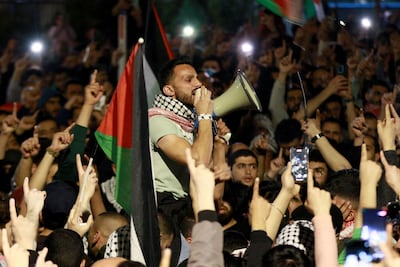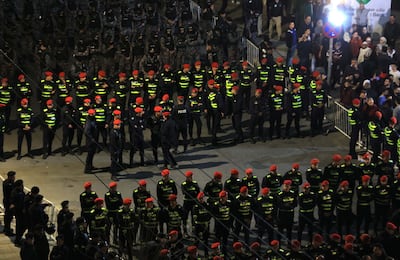Live updates: Follow the latest news on Israel-Gaza
Before King Abdullah broke his Ramadan fast at a recent iftar in Amman, he discussed the war in Gaza with his guests, religious and civil leaders who had made the short journey from Jerusalem.
“We will be always with you,” he told the Palestinian delegates at the Husseiniya Palace, where the atmosphere was solemn.
During his brief comments on the war, the king also stressed that Israeli attacks on Palestinians in the occupied West Bank, just across the border from Jordan, had the potential to widen the conflict.
With the death toll from the war in Gaza mounting daily, the king wanted to hear the views of his guests on the war, according to one person who attended.
Among those present were Sheikh Azzam Al Khatib Al Tamimi, head of the Jordanian-run Jerusalem religious affairs department, which is in charge of the daily administration and upkeep of Al Aqsa Mosque, the Grand Mufti of Jerusalem, Sheikh Muhammad Ahmad Hussein, and Pierbattista Pizzaballa, the Latin Patriarch of Jerusalem.
They reportedly spoke of the historic role Jordan's ruling dynasty, the Hashemites, had played in advocating for Palestinian rights in Jerusalem.
The iftar was the latest display of official solidarity with the Palestinians in Jordan. But while King Abdullah and his government have repeatedly called for a ceasefire and voiced their support for the Palestinian people, six months of war in Gaza have provided a difficult domestic policy challenge.

Jordan is officially a supporter of the two-state solution and advocates for a Palestinian state. It previously controlled the West Bank until Israel seized it in the 1967 war, and is home to millions of Palestinians, many of them refugees forced from their homes by Israel.
Yet Jordan also signed a peace treaty with Israel in 1994, and is a close ally of the US, Israel's most important backer. The kingdom also fought a bloody conflict with Palestinian militants in 1970, and is wary of Hamas and other groups from dragging it into a war.
This has proved a delicate balancing act for Jordan's king as he tries to navigate a dangerous regional environment.
Jordanians have been increasingly vocal in their criticism of Jordan's ties with Israel, on social media and at protests near the Israeli embassy and a few other sites in Amman where authorities have permitted demonstrations.
The government in Amman has sought to counter attempts by Hamas to mobilise support from Palestinians.
Officials responded with scorn after Hamas commander Mohammed Al Deif called on Jordanians and other Arabs to “march towards Palestine” last week.
Communication Minister Muhannad Al Mubaideen described Mr Al Deif's call as a “desperation” move.
Samih Maaytah, a former information minister, said that Jordanian citizenship should be withdrawn from any Hamas figures engaging in what he called agitation.
Their comments came amid demonstrations in Rabieh, the Amman district where the Israeli embassy is located.

Almost every day, since last week, thousands have gathered to demand that Jordan open a front against Israel and abrogate the 1994 peace treaty.
At least twice, security forces have dispersed the protesters, to prevent them coming too close to the Israeli embassy.
Several leaders in the Islamic Action Front, the Jordanian branch of the Muslim Brotherhood, have been arrested at the demonstrations. Hamas is supported by the Muslim Brotherhood, which is banned in most Arab countries, but not Jordan.
Saud Sharafat, a former senior member of Jordanian intelligence, said that some Hamas leaders and their backers in Tehran want to portray the Jordanian government as “resisting the will of the street.”
He praised the authorities for navigating the challenge, and said they have displayed skill in allowing protesters to test the limits of dissent, while also maintaining public order.

The daily protests are mostly young men from working class backgrounds. The Muslim shout of “God is greater” often interrupts chants glorifying Hamas military leaders.
Members of leftist movements and a group of military retirees who oppose the kingdom's ties with Israel have also been attending the protests, joined by some students at private universities and expensive private high schools.
The core, however, are Muslim Brotherhood members and their sympathisers, said Mr Sharafat, founder of the Shorufat Centre for the Study of Globalisation and Terrorism.
“The Brotherhood are the only ones who can organise the street like this,” said Mr Sharafat. The group might be overstepping limits that have allowed it to operate legally in Jordan, he added.
Their calls for Jordan to cancel its peace treaty with Israel, a cornerstone of Amman's foreign policy and alliance with Washington, “amount to political suicide” and will continue to be ignored by the authorities, he said.
He praised King Abdullah's handling of the war, and his policy of turning the kingdom into a hub for humanitarian supplies to be dropped into Gaza.
The king has also secured apparent US support on the need to contain Israeli actions in the West Bank, with the main aim of preventing another wave of refugees to Jordan. The kingdom absorbed refugees in 1948 and 1967, resulting in a large proportion of Jordan's 10 million people having Palestinian origin. The vast majority of them have Jordanian citizenship.
Palestinians and their descendants play important roles in the private sector, while members of the tribes who were in the area before what was known as Transjordan was founded as a British protectorate underpin the security forces and the bureaucracy.
The political legitimacy of the king among both groups is boosted by the traditional Hashemite role as custodian of Jerusalem's Al Aqsa Mosque, one of the holiest sites in Islam.
But King Abdullah has made it clear that Jordan cannot accept another wave of refugees.
In meetings with Arab and western officials, the king has not hidden his frustration that Jordan's push for a Gaza truce before Ramadan failed to find a breakthrough, a senior diplomat who recently met with palace officials said.
In the meantime, Israel's attacks on Iranian targets have raised tensions across the region.
The possibility has been raised that Jordan could be retaliated against after Monday's Israeli attack on an Iranian diplomatic compound in Damascus that killed several elite IRGC commanders. Three US soldiers were killed in February in an attack by Iran-backed militias on their post on the Jordanian-Syrian border.
An attempt this week by pro-Iranian militia forces in Iraq to strike the Israeli port of Eilat may have been carried out with a drone that flew over Jordan.
The diplomat said that “Jordanian messaging about the gravity of Israeli conduct has been consistent”.
But the upper echelons in Jordan of “realise that the Israelis are going all the way in Gaza”.
“The establishment has been adept at placating the population,” the diplomat said. “But the longer the war goes on, the more difficult it is becoming.”


